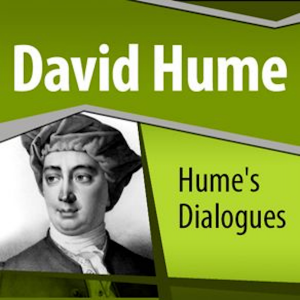

Hume’s Dialogues Concerning Natural Religion
David Hume
David Hume’s Dialogues Concerning Natural Religion had not yet been published when he died in 1776. Even though the manuscript was mostly written during the 1750s, it did not appear until 1779. The subject itself was too delicate and controversial, and Hume’s dialectical examination of religious knowledge was especially provocative. What should we teach young people about religion?
The characters Demea, Cleanthes, and Philo passionately present and defend three sharply different answers to that question. Demea opens the dialogue with a position derived from Rene; Descartes and Father Malebranche—God’s nature is a mystery, but God’s existence can be proved logically. Cleanthes attacks that view, both because it leads to mysticism and because it attempts the impossible task of trying to establish existence on the basis pure reason, without appeal to sense experience.
As an alternative, he offers a proof of both God’s existence and God’s nature based on the same kind of scientific reasoning established by Copernicus, Galileo, and Newton. Taking a skeptical approach, Philo presents a series of arguments that question any attempt to use reason as a basis for religious faith. He suggests that human beings might be better off without religion.
The dialogue ends without agreement among the characters, justifying Hume’s choice of dialogue as the literary style for this topic.
Duration - 4h 17m.
Author - David Hume.
Narrator - Ray Childs.
Published Date - Thursday, 30 January 2025.
Location:
United States
Description:
David Hume’s Dialogues Concerning Natural Religion had not yet been published when he died in 1776. Even though the manuscript was mostly written during the 1750s, it did not appear until 1779. The subject itself was too delicate and controversial, and Hume’s dialectical examination of religious knowledge was especially provocative. What should we teach young people about religion? The characters Demea, Cleanthes, and Philo passionately present and defend three sharply different answers to that question. Demea opens the dialogue with a position derived from Rene; Descartes and Father Malebranche—God’s nature is a mystery, but God’s existence can be proved logically. Cleanthes attacks that view, both because it leads to mysticism and because it attempts the impossible task of trying to establish existence on the basis pure reason, without appeal to sense experience. As an alternative, he offers a proof of both God’s existence and God’s nature based on the same kind of scientific reasoning established by Copernicus, Galileo, and Newton. Taking a skeptical approach, Philo presents a series of arguments that question any attempt to use reason as a basis for religious faith. He suggests that human beings might be better off without religion. The dialogue ends without agreement among the characters, justifying Hume’s choice of dialogue as the literary style for this topic. Duration - 4h 17m. Author - David Hume. Narrator - Ray Childs. Published Date - Thursday, 30 January 2025.
Language:
English
Chapter 1
Duración:00:03:00
Chapter 2
Duración:00:02:59
Chapter 3
Duración:00:03:05
Chapter 4
Duración:00:03:01
Chapter 5
Duración:00:02:38
Chapter 6
Duración:00:03:00
Chapter 7
Duración:00:04:02
Chapter 8
Duración:00:02:54
Chapter 9
Duración:00:02:56
Chapter 10
Duración:00:02:39
Chapter 11
Duración:00:03:00
Chapter 12
Duración:00:03:18
Chapter 13
Duración:00:03:51
Chapter 14
Duración:00:03:07
Chapter 15
Duración:00:03:10
Chapter 16
Duración:00:02:41
Chapter 17
Duración:00:01:48
Chapter 18
Duración:00:03:26
Chapter 19
Duración:00:02:38
Chapter 20
Duración:00:03:44
Chapter 21
Duración:00:02:59
Chapter 22
Duración:00:03:40
Chapter 23
Duración:00:03:28
Chapter 24
Duración:00:02:48
Chapter 25
Duración:00:03:12
Chapter 26
Duración:00:02:39
Chapter 27
Duración:00:02:10
Chapter 28
Duración:00:02:52
Chapter 29
Duración:00:03:03
Chapter 30
Duración:00:03:08
Chapter 31
Duración:00:02:34
Chapter 32
Duración:00:03:11
Chapter 33
Duración:00:03:12
Chapter 34
Duración:00:04:10
Chapter 35
Duración:00:03:09
Chapter 36
Duración:00:02:57
Chapter 37
Duración:00:02:55
Chapter 38
Duración:00:03:10
Chapter 39
Duración:00:02:53
Chapter 40
Duración:00:02:42
Chapter 41
Duración:00:02:28
Chapter 42
Duración:00:01:53
Chapter 43
Duración:00:01:36
Chapter 44
Duración:00:04:01
Chapter 45
Duración:00:02:25
Chapter 46
Duración:00:02:50
Chapter 47
Duración:00:03:12
Chapter 48
Duración:00:02:35
Chapter 49
Duración:00:02:26
Chapter 50
Duración:00:03:02
Chapter 51
Duración:00:02:56
Chapter 52
Duración:00:02:50
Chapter 53
Duración:00:03:18
Chapter 54
Duración:00:01:43
Chapter 55
Duración:00:02:56
Chapter 56
Duración:00:03:09
Chapter 57
Duración:00:03:08
Chapter 58
Duración:00:03:00
Chapter 59
Duración:00:03:40
Chapter 60
Duración:00:02:52
Chapter 61
Duración:00:02:59
Chapter 62
Duración:00:03:25
Chapter 63
Duración:00:02:54
Chapter 64
Duración:00:03:08
Chapter 65
Duración:00:01:08
Chapter 66
Duración:00:02:59
Chapter 67
Duración:00:03:20
Chapter 68
Duración:00:03:15
Chapter 69
Duración:00:02:04
Chapter 70
Duración:00:03:03
Chapter 71
Duración:00:02:46
Chapter 72
Duración:00:02:37
Chapter 73
Duración:00:02:04
Chapter 74
Duración:00:03:19
Chapter 75
Duración:00:00:34
Chapter 76
Duración:00:02:37
Chapter 77
Duración:00:02:43
Chapter 78
Duración:00:02:53
Chapter 79
Duración:00:03:27
Chapter 80
Duración:00:02:16
Chapter 81
Duración:00:03:10
Chapter 82
Duración:00:03:40
Chapter 83
Duración:00:03:53
Chapter 84
Duración:00:02:52
Chapter 85
Duración:00:04:04
Chapter 86
Duración:00:03:54
Chapter 87
Duración:00:04:08